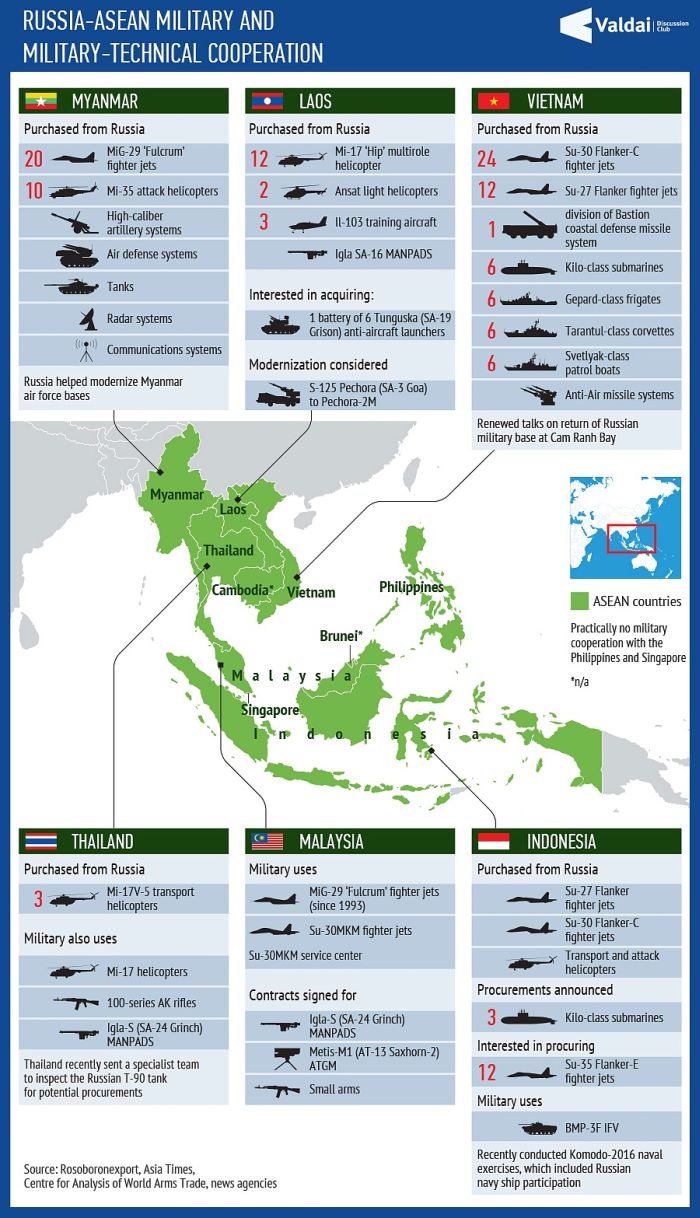The current situation in East Asia, which is developing under the influence of rivalry between the United States and China, encourages many countries of the region to diversify foreign relations in order to avoid excessive dependence on one of the global players, to maintain flexibility and freedom of political maneuver. This is the keynote of the visit to Russia of the President of the Philippines Rodrigo Duterte, says Valdai Club expert Viktor Sumsky, Director of the ASEAN Center at the Moscow State Institute of International Relations of the Russian Foreign Ministry.
After the election in May 2016, the new president of the Philippines Rodrigo Duterte announced, that his country would move away from a one-sided orientation toward the US, drawing closer ties with China and Russia. Russia, for its part, is interested to widen the number of real partners in Asia, which increases range of opportunities related to trade, economic, defense and investment cooperation, exchanges in education, science and culture. Over the past year, Russian-Philippine bilateral contacts have significantly increased in various areas, which did not happen before in the history of relations between the two countries.
Naturally, the joint efforts to strengthen regional security in South-East Asia are not the last in the list of priorities. All these issues are on the agenda of the talks in Moscow between the presidents of Russia and the Philippines on May 23.
Defense agreement
The Philippine side has more than once explained that the future agreement on cooperation with Russia in the field of defense does not mean the establishment of a military alliance. From the technical point of view the military equipment of the Philippine army is rather obsolete. The Philippines stands behind most of its ASEAN partners – and this happened after decades of the military and political embrace from the United States.
The Filipinos got from the former colonial power mostly morally obsolete and worn-out weapons. Against this background they showed interest to the less expensive but modern and reliable production of the Russian military-industrial complex - especially since many of the Russian weapons have been shipped to the ASEAN countries, that are partners of the Philippines - Vietnam, Indonesia, Cambodia, Laos, Malaysia, Myanmar.
By the way, it is not the first time the Filipinos wish to buy Russian weapons: for example, this issue was raised during the official visit to Moscow in September 1997 by then-President Fidel Ramos, but at that time "the stars did not converge".
Will the arms deal between the Philippines and Russia violate the military-political balance in South-East Asia? Hardly. The overall military supplies of Russia to the Southeast Asian countries over the past 20 years have not led to a similar result. Let no one be embarrassed that President Duterte arrives in Russia accompanied by a big group of military brass. Virtually none of these people (as, indeed, many other representatives of the administrative elite of the Philippines) had never been in Russia. All of them need to feel the country with which they are going to cooperate, to see it not through the prism of stereotypes, but with their own eyes. In this sense, Duterte's visit is a necessary prelude to cooperation in the field of defense.
Infographics: Russia-ASEAN military and military-technical cooperation
In addition to generals, the Philippine leader is accompanied by a representative delegation of local businessmen. The visit will be accompanied by a business forum, where the guests will meet with potential Russian partners to discuss the best forms of cooperation in energy, infrastructure and transport, agriculture, and tourism. It is hard to imagine that the presidents of Russia and the Philippines during their meeting on May 25 will not touch these issues, as well as regional security problem, without which the sustained growth of Asian economies is impossible.
Philippines-US relations
The whole world already knows that President Duterte has a ready tongue when someone comes to teach him how to rule a sovereign state, what needs to be done and what not to do. After a memorable episode with Barack Obama, there are no other people who want to "instruct" Rodrigo Duterte, and Donald Trump communicates with his Philippine colleague quite properly. If nothing extraordinary happens, these two leaders will find a common language, and the relations of the Philippines with the US will develop in a proper way.





